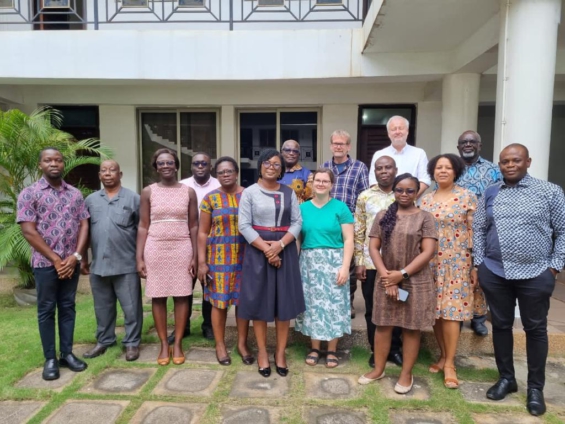The Coastal Community Resilience to Climate and Diarrhoea (C2RCD) is set to organize a short course on Visual Basic for Applications (VBA) in Excel, focusing on data handling and modelling in Ghana.
This is a partnership between the University of Ghana and Danish partner, Aarhus University, and forms part of the efforts of the two universities to build the capacities of researchers and students to leverage on critical modern cutting-edge technological tools for academic data handling and modelling.
The course, scheduled to take place on September 7, 2023, at the Centre for Climate Change and Sustainability Studies (CCCSS) Auditorium, would be a one-day, hands-on short course that will provide participants with an introductory understanding of VBA.
It is expected to empower researchers and students of the University of Ghana to adopt a VBA macro-based programming to accomplish more complex tasks through the creation of customized forms for data input and output, and manipulations for enhanced research projects. This critical tool builds on the traditional Excel functionalities that rely only on cell-based calculations for research.
Both universities, through the C2R-CD Project, have over the years been modelling the interactions between climatic, hydrological, environmental, epidemiological, institutional, and socio-cultural determinants of diarrhoea to improve diarrhoeal management in coastal communities in Ghana.
At the University of Ghana, the project is led by the Institute for Environment and Sanitation Studies (IESS).
The project has been generating long-term data series in Anyako, Anyanui and Atiteti (Volta Region), Eastern Coast; Opetekwei (Greater Accra Region) and Mumford (Central Region), Central Coast of Ghana to model the interactions between climatic, hydrological, environmental, epidemiological, institutional and socio-cultural determinants of diarrhoea with the aim to among other things, improve diarrhoeal management in coastal communities.
Latest Stories
-
FIFA Club World Cup 2025: Sundowns, Esperance join Al Ahly and Wydad as CAF representatives
2 hours -
CAFCL: Al Ahly set up historic final with ES Tunis
3 hours -
We didn’t sneak out 10 BVDs; they were auctioned as obsolete equipment – EC
6 hours -
King Charles to resume public duties after progress in cancer treatment
7 hours -
Arda Guler scores on first start in La Liga as Madrid beat Real Sociedad
7 hours -
Fatawu Issahaku’s Leicester City secures Premier League promotion after Leeds defeat
7 hours -
Anticipation builds as Junior Speller hosts nationwide auditions
8 hours -
Etse Sikanku: The driver’s mate conundrum
9 hours -
IMF Deputy Chief worried large chunk of Eurobonds is used to service debt
9 hours -
Otumfuo Osei Tutu II celebrates 25 years of peaceful rule on golden stool
9 hours -
We have enough funds to pay accruing benefits; we’ve never missed pension payments since 1991 – SSNIT
9 hours -
Let’s embrace shared vision and propel National Banking College – First Deputy Governor
10 hours -
Liverpool agree compensation deal with Feyenoord for Slot
10 hours -
Ejisu by-election: There’s no evidence of NPP engaging in vote-buying – Ahiagbah
10 hours -
Ejisu by-election: Independent ex-NPP MP’s campaign team warns party against dubious tactics
10 hours

